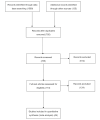The Associations Between Gaming Motivation and Internet Gaming Disorder: Systematic Review and Meta-analysis
- PMID: 35175204
- PMCID: PMC8895288
- DOI: 10.2196/23700
The Associations Between Gaming Motivation and Internet Gaming Disorder: Systematic Review and Meta-analysis
Abstract
Background: There has been a surge in interest in examining internet gaming disorder (IGD) and its associations with gaming motivation. Three broad components of gaming motivation have been proposed: achievement, immersion, and social. Achievement-oriented players are motivated by gaining in-game rewards, immersion-oriented players are motivated by the experience of immersion in the virtual world, and social-oriented players are motivated by the need to socialize with other players through gaming.
Objective: This study aimed to (1) quantitatively synthesize the growing body of literature to systematically examine the discrepancies in the magnitude of associations between various components of gaming motivation and IGD and (2) examine the moderating role of cultural dimension on the association between escapism gaming motivation and IGD.
Methods: We conducted a systematic search of multiple databases between 2002 and 2020. Studies were included if they (1) included quantitative data, (2) used measures assessing both gaming motivation and IGD, and (3) contained sufficient information for effect size calculation.
Results: The findings revealed IGD to have a stronger association with achievement motivation (r=0.32) than with immersion (r=0.22) or social motivation (r=0.20), but the strongest such association was found to be with escapism motivation (r=0.40), a subcomponent of immersion motivation. Our cross-cultural comparison further showed a stronger association between escapism motivation and IGD in studies conducted in individualistic (vs collectivistic) regions.
Conclusions: This meta-analysis highlights the importance of acknowledging the discrepancies among different components of gaming motivation with respect to their role in the development of IGD, as well as the potential cultural variations in the strength of such associations.
Keywords: compulsive gaming; cross-cultural comparison, cultural individualism; culture; escapism; gaming disorder; gaming motivation; online gaming; problematic gaming; video gaming.
©Hsin-Yi Wang, Cecilia Cheng. Originally published in JMIR Mental Health (https://mental.jmir.org), 17.02.2022.
Conflict of interest statement
Conflicts of Interest: None declared.
Figures
Similar articles
-
Internet gaming disorder behaviours: a preliminary exploration of individualism and collectivism profiles.BMC Psychiatry. 2021 May 20;21(1):262. doi: 10.1186/s12888-021-03245-8. BMC Psychiatry. 2021. PMID: 34016087 Free PMC article.
-
Cross-Cultural Differences in the Pathways to Internet Gaming Disorder.Asia Pac Psychiatry. 2024 Dec;16(4):e12565. doi: 10.1111/appy.12565. Asia Pac Psychiatry. 2024. PMID: 39390779
-
Choice of Leisure Activities by Adolescents and Adults With Internet Gaming Disorder: Development and Feasibility Study of a Virtual Reality Program.JMIR Serious Games. 2020 Dec 11;8(4):e18473. doi: 10.2196/18473. JMIR Serious Games. 2020. PMID: 33306033 Free PMC article.
-
Escaping through virtual gaming-what is the association with emotional, social, and mental health? A systematic review.Front Psychiatry. 2023 Nov 8;14:1257685. doi: 10.3389/fpsyt.2023.1257685. eCollection 2023. Front Psychiatry. 2023. PMID: 38025467 Free PMC article.
-
Internet Gaming Disorder: An Emergent Health Issue for Men.Am J Mens Health. 2018 Jul;12(4):1151-1159. doi: 10.1177/1557988318766950. Epub 2018 Apr 1. Am J Mens Health. 2018. PMID: 29606034 Free PMC article. Review.
Cited by
-
Time Spent Gaming, Device Type, Addiction Scores, and Well-being of Adolescent English Gamers in the 2021 OxWell Survey: Latent Profile Analysis.JMIR Pediatr Parent. 2022 Nov 18;5(4):e41480. doi: 10.2196/41480. JMIR Pediatr Parent. 2022. PMID: 36399378 Free PMC article.
-
Explanatory model of behavioral adaptation in video game addiction among adolescents in urban and rural Peru: the mediating role of anxiety.Front Psychol. 2025 Apr 8;16:1500800. doi: 10.3389/fpsyg.2025.1500800. eCollection 2025. Front Psychol. 2025. PMID: 40264997 Free PMC article.
-
Novel rat model of gaming disorder: assessment of social reward and sex differences in behavior and c-Fos brain activity.Psychopharmacology (Berl). 2025 May;242(5):1103-1122. doi: 10.1007/s00213-024-06576-y. Epub 2024 Apr 5. Psychopharmacology (Berl). 2025. PMID: 38575792 Free PMC article.
-
Client's Experiences Using a Location-Based Technology ICT System during Gambling Treatments' Crucial Components: A Qualitative Study.Int J Environ Res Public Health. 2022 Mar 22;19(7):3769. doi: 10.3390/ijerph19073769. Int J Environ Res Public Health. 2022. PMID: 35409450 Free PMC article.
-
Differences between recreational gamers and Internet Gaming Disorder candidates in a sample of Animal Crossing: New Horizons players.Sci Rep. 2023 Mar 29;13(1):5102. doi: 10.1038/s41598-023-32113-6. Sci Rep. 2023. PMID: 36991080 Free PMC article.
References
-
- Petry NM, Rehbein F, Gentile DA, Lemmens JS, Rumpf H, Mößle Thomas, Bischof G, Tao R, Fung DSS, Borges G, Auriacombe M, González Ibáñez Angels, Tam P, O'Brien CP. An international consensus for assessing internet gaming disorder using the new DSM-5 approach. Addiction. 2014 Sep 23;109(9):1399–406. doi: 10.1111/add.12457. - DOI - PubMed
-
- Wang H, Cheng C. New perspectives on the prevalence and associated factors of gaming disorder in Hong Kong community adults: A generational approach. Comput Human Behav. 2021 Jan;114:106574. doi: 10.1016/j.chb.2020.106574. - DOI
Publication types
LinkOut - more resources
Full Text Sources


